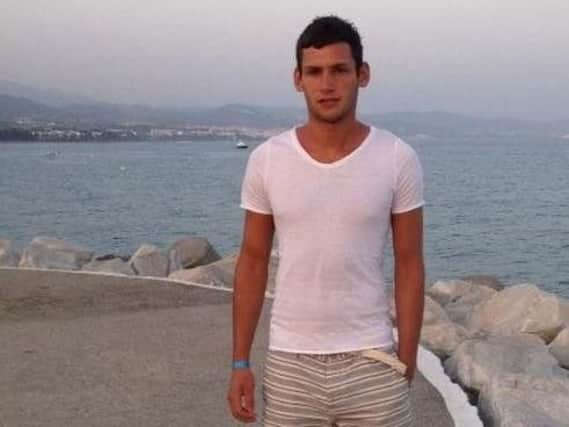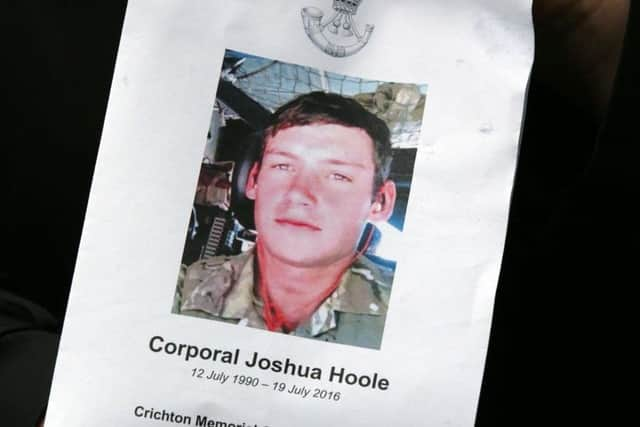Coroner questions 'completely different' accounts of Scottish soldier's death


Corporal Joshua Hoole, described as "fit, capable and determined" died within an hour of collapsing during an annual fitness test (AFT) at Brecon, Wales, on the morning of July 19 2016.
Cpl Hoole, of Ecclefechan, Dumfries and Galloway, died three years after three Army reservists suffered fatal heat illness during an SAS selection march in the Brecon Beacons.
Advertisement
Hide AdAdvertisement
Hide AdOn Monday, the inquest into his death at Birmingham Coroner's Court heard testimony from serving soldier Lance Corporal James Burge, who was withdrawn from the march before Cpl Hoole collapsed.


Senior Coroner Louise Hunt directly asked him about differences between two statements he gave about when he was pulled from the test, earlier that day.
In a statement to the defence service inquiry in September 2016, a few weeks after the incident, L/Cpl Burge described how the officer running the march, Captain Colin Newfer, had told him he looked "dehydrated" and had "gone a funny colour".
He then repeated that account in a later statement, in January 2019.
But in his most recent written account, which he voluntarily gave to the Royal Military Police on February 20, he said he had been "mistaken" and that it was the march medic who had withdrawn him.
He added that his use of the words "dehydration" and "casualty" in his first accounts were also incorrect.
In the first account, he described coming up a long incline and "was probably about 50 metres away from the main body (of the group)".
He said: "Captain Newfer was up the top and pretty much threw me in the minibus, claimed I was dehydrated, that I'd gone a funny colour.
Advertisement
Hide AdAdvertisement
Hide Ad"But I insisted I carry on knowing that was the hardest point."
"Why have you changed your account?"
Ms Hunt asked: "I find it slightly strange that you should, on February 20, for the very first time raise the fact it was not Captain Newfer when in the earlier statement in January and to the service inquiry (in 2016) you had said it was.
"Why have you changed your account on February 20, and only then?"
He replied: "I still was told by Captain Newfer I was to come off the course - the only thing to change was the dehydration and change in colour, not Capt Newfer."
L/Cpl Burge said: "I made a mistake."
Ms Hunt then asked: "Did anyone speak to you at the beginning of this year - again you do not have to answer this question - did anyone speak, or approach, or contact you in any way to ask you to change your account?"
L/Cpl Burge replied: "No, Ma'am."
Ms Hunt asked why then it was that in his February 20 statement, he had said: "I recall now when I was informed I was being withdrawn it was by the medic, not Capt Newfer".
She said that he had also stated "when I used the word 'dehydrated', I meant to use the word 'exhausted', and when I referred to myself as a 'casualty', I meant to use the word 'man-down'".
Ms Hunt asked: "I don't understand why when you've already done a statement to Royal Military Police in January - and don't mention any of this - you then come to make a completely different statement on February 20.
"You don't think that's a little odd?"
Advertisement
Hide AdAdvertisement
Hide AdL/Cpl Burge, a veteran of Afghanistan, replied: "I thought I'd try and change my statement to where I believe it was correct."
The soldier, of 1 Rifles, was also asked why he had described Capt Newfer as "a scary man" in his original statement.
He replied the remark reflected "how he came across to me".
Asked by Ms Hunt which was "the right account", he replied: "Honestly, I don't particularly know, Ma'am."
The coroner said: "You don't? But you accept something you write down closer to the event is more likely to be correct?"
"Yes," he replied.
Incorrect temperature readings
Capt Newfer is set to give evidence to the inquest later this week.
Earlier, Corporal Jonathan Mason told the inquest how he pulled out of the march after feeling "dizzy".
He described coming across two other soldiers, who collapsed before Cpl Hoole, that day.
Cpl Mason said he watched Lance Corporal George Knight "stumble off to the side, into a bush" and later on, came across another soldier "on the floor".
Advertisement
Hide AdAdvertisement
Hide AdDescribing the man as "a lot worse" than L/Cpl Knight, he said: "We tried to stand him up and his eyes were rolling back."
The coroner has previously heard a temperature gauge used to determine whether the exercise should have continued was "erroneously" placed in the shade of a building at Dering Lines barracks, giving incorrectly low heat readings on that morning.
The inquest continues.
